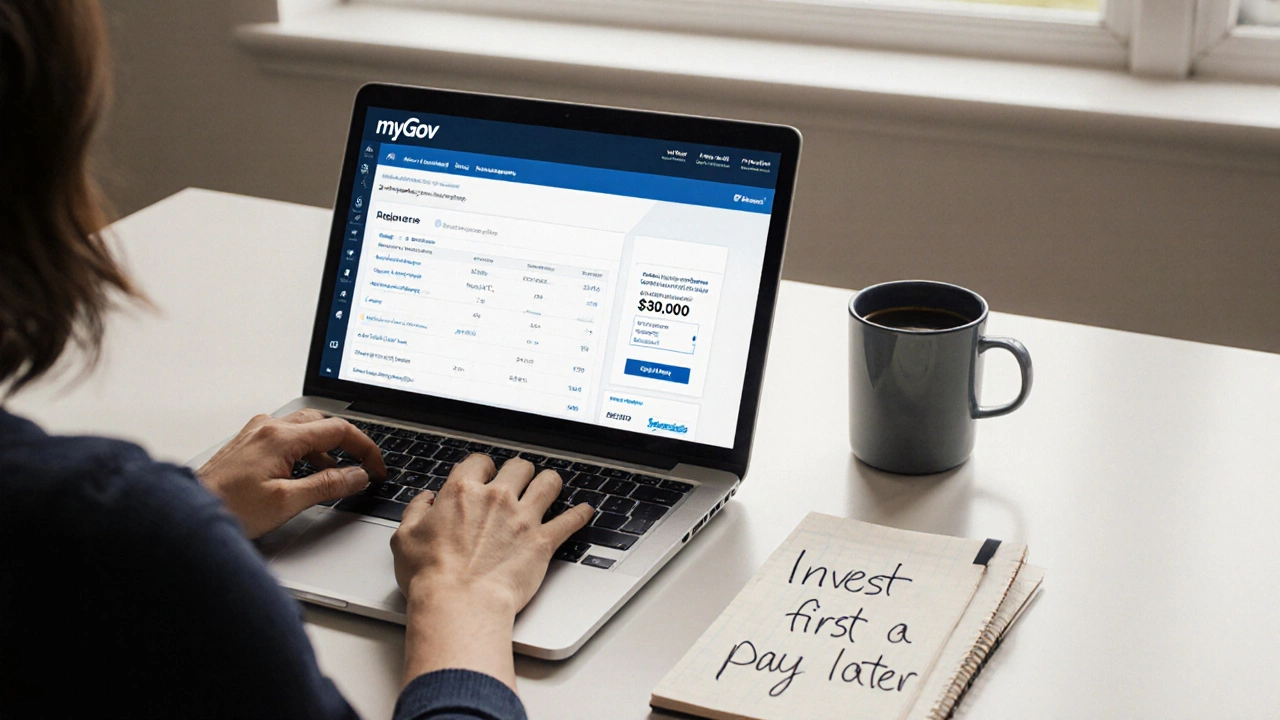Paying off student loans is a pressing issue for many graduates, and the stakes are incredibly high. Failing to keep up with loan payments can result in severe consequences that affect one's financial stability and creditworthiness.
Many borrowers are unaware of the full range of repercussions that come with not paying their student loans, which go beyond mere late fees or collection calls. This article aims to shed light on what really happens when you neglect these debts, offering insights and advice for navigating such tricky financial waters.
By understanding the potential outcomes, borrowers can make informed decisions and potentially avoid a financial disaster.
- Understanding Loan Default
- Immediate Effects of Non-Payment
- Long-Term Impacts on Credit
- Legal Consequences and Wage Garnishment
- Government Collection Tactics
- Strategies to Avoid Default
Understanding Loan Default
When you take out a student loan, it comes with a set of rules and expectations. One of the most crucial is staying on top of your payments. A loan enters default status when regular payments are not made for a specified period. Typically, for federal student loans, this period is 270 days of non-payment. The exact timeframe may vary for private loans, sometimes becoming much shorter.
Once you hit default, you’re navigating choppy waters. This isn’t just a missed payment — it’s a significant breach of your loan agreement that comes with extra costs and potential litigation. Interest can accrue rapidly, penalties pile up, and collection efforts by the lender kick into high gear. The balance on your loan can swell, making repayment even more intimidating. Proactively understanding these dynamics can keep you afloat and steer you clear of financial pitfalls.
Consequences of Default
One critical fallout of default is the immediate impact on your credit score. Credit reporting agencies categorize default as a significant derogatory event, which can cause a substantial dip in your score. This damage hampers your financial freedom, affecting your eligibility for future loans or lines of credit. The lower credit score also translates to higher interest rates, costing you more in the long run on other financial obligations.
In the default situation, you potentially face collection charges. These fees are often added on top of your remaining balance, further inflating the amount you owe. Sometimes loan guarantors step in to absorb part of the loss for the lender, but they will pursue full recovery from you, the borrower. The stakes are high and vigilance is paramount in managing a loan's life cycle diligently.
“Defaulting on a student loan can have serious long-term consequences, including a damaged credit score, which makes borrowing later much more difficult and expensive.” - Financial Industry Regulatory Authority (FINRA)
A Path to Solution
Recognizing default as an early warning signal is the first step toward resolution. Federal loans are more lenient, often offering rehabilitation options. This process involves making nine consecutive on-time payments, which can lead to removing the default status. Another pathway is loan consolidation, which lumps your federal loans into a single new loan, effectively getting you out of default and back on track.
Taking swift, decisive action can correct course and mitigate further damage. Understanding these options is essential for any borrower who wants to rise above the setbacks associated with loan default. Armed with the right knowledge and strategy, you can emerge from default status and regain control over your financial future.
Immediate Effects of Non-Payment
Failing to pay your student loans may seem like a small oversight, but the consequences hit fast and hard. As soon as you miss a payment, the clock starts ticking. Typically, within a few days, you will receive a notification from your lender reminding you of your overdue payment. This serves as your first official warning, but it's important to act swiftly to avoid more serious repercussions. Ignorance can no longer be bliss when these notifications begin to pile up month after month.
Within 30 days of missing a payment, your loan enters the delinquency stage. During this time, interest continues to accrue, meaning that your debt quietly but persistently grows. Lenders often report this delinquency to the major credit bureaus, including Experian, TransUnion, and Equifax. This report can significantly impact your credit score, leading to a lower credit rating that may affect your ability to secure new credit lines, loans, or even rental agreements in the future.
An insightful fact for borrowers to remember is how quickly a missed payment can escalate into a major issue. Approximately 15% of American borrowers default on federal student loans, as highlighted by data from the U.S. Department of Education. This statistic serves as a critical reminder of how common this situation is and the importance of addressing missed payments immediately.
"The key to preventing severe financial consequences from missed student loan payments is to engage proactively with your borrower's resources," according to financial expert Suze Orman. "Acting quickly to rectify missed payments can significantly reduce the potential for a deep financial impact."
Another immediate effect often overlooked is the psychological stress that accompanies financial instability. Missing payments can lead to anxiety, depression, and a sense of hopelessness about one's financial future. The mental toll can be just as significant as the financial detriment, impacting your overall quality of life and your ability to focus on other important life tasks.
It's also prudent to be aware of the administrative fees that could be tacked on if you fail to pay your loans on time. These fees serve as an additional punitive measure from the lender, which can exacerbate an already stressful situation. This snowball effect of growing debt and rising expenses highlights the urgency in addressing the issue immediately.

Long-Term Impacts on Credit
The thought of not being able to pay your student loans on time is nerve-wracking enough, but when those missed payments begin to affect your credit score, the repercussions can extend far beyond the immediate stress of overdue debts. A drop in your credit score can make borrowing in the future significantly more difficult, affecting everything from buying a car to securing a mortgage. Current credit scoring models heavily weigh the timeliness of payments, and student loans are no exception. Missing payments consecutively can plummet your score by over 90 points or more, spiraling the situation into a realm that can take years to recover from.
Any default on your loans not only tarnishes your credit history but also stays on your credit report for up to seven years. The impact is not just the initial hit your score takes but the ongoing battle of proving creditworthiness when creditors see that lingering black mark. This scenario complicates securing any future loans and often inflates the interest rates offered to you by financial institutions. Landlords also frequently check credit scores as part of tenant screening processes, so your housing options might be inadvertently affected by how you handle your debts today.
It's worth noting how much influence these loans, or a lack of their repayment, can exert on your financial future. Not only is renting or owning property more difficult, but even signing a cellphone contract or opening a credit card can require a higher deposit if your credit score is lacking due to unpaid student loans. The financial world is deeply interconnected, and one unresolved issue in this domain can echo throughout many facets of your life. According to a 2023 study by Experian, a leading credit bureau, individuals with strong financial habits post-education found it significantly easier to increase their credit limits, invest, and save at much more favorable rates than those with student loan delinquencies.
"Credit scores are not just numbers; they’re reflections of your borrowing behavior, and unfortunately, missing out on your student loan payments sends a resoundingly negative message," says John Ulzheimer, credit expert and speaker known for his insights into the credit industry. "Each unpaid payment is a dent not only in your financial health but in your perceived reliability as a borrower."
Understanding these implications offers more than a cautionary tale; it provides an impetus for borrowers to take proactive steps. To mitigate these negative outcomes, reaching out to your lender early can sometimes open doors to repaying in manageable terms—such as income-driven repayment plans or temporary deferments. Overlooking those student loan notices is detrimental not just for now, but for years to come. If not resolved, the stress can also affect your career choices, as employers in certain industries might review credit histories as part of their hiring processes. Hence, being proactive can not only save money in interest and fees but also open up life opportunities that otherwise remain closed off to the financially irresponsible.
Legal Consequences and Wage Garnishment
When it comes to defaulting on student loans, the legal consequences are nothing short of sobering. Once your loans are in default, the lender—from a federal body to a private institution—has several legal tools at its disposal to recover the debt. One primary method they use is wage garnishment. This involves taking a portion of your paycheck directly from your employer, before it even reaches your bank account. It’s a harsh measure, but one that’s authorized by law and can severely impact your financial well-being. In most cases, up to 15% of your disposable income can be taken by the government without a court order. This is a chilling reminder of how serious ignoring those loan payments can get.
Not only is wage garnishment a blunt instrument, but it's also a deeply embarrassing one, affecting your relationship with your employer since they will be notified of your financial woes. You might wonder why such drastic legal measures are allowed. The origin of these practices can be traced back to laws that protect lenders while ensuring loans are repaid promptly. These laws are particularly favorable to federal lenders, given their pivotal role in funding higher education. In fact, federal student loan collections don't have a statute of limitations, meaning they can pursue you for the debt as long as it takes. As former Department of Education official Betsy Mayotte once said,
"The collections power of the government is rather extensive, and they’re not afraid to use it."
If the idea of your paycheck being garnished isn’t unnerving enough, consider the other potential legal actions. Your tax refunds and Social Security benefits can also be intercepted by the federal government to offset debts. While private lenders don’t have that power, they can still take you to court, leading to judgments against you that can also result in wage garnishment or even bank account levies. The legal consequences stretch further, potentially leading to a lien against your house or car. All these measures are designed to recoup funds at any conceivable cost to you, which explains why staying ahead of your loans is crucial.
In light of these tough repercussions, you might wonder how many people fall into this trap. A glance at a recent Department of Education report shows that nearly 5 million borrowers in the United States are in default on their student loans. These numbers illustrate a significant portion of borrowers who either cannot or choose not to repay their debts, thus experiencing the harsh reality of legal consequences. Taking proactive steps such as consulting with financial advisors or consolidating loans can provide significant relief. At the very least, knowing these facts underscores why tackling student loan debt head-on can prevent a cascade of legal and financial repercussions.

Government Collection Tactics
When borrowers fall behind on their student loans, the government employs various strategies to collect the outstanding debt. This isn't like defaulting on a personal loan or a credit card; the government possesses unique powers that make their collection efforts all the more potent. Once a borrower defaults, the debt becomes a serious issue often referred to as 'collections.' This is managed by agencies equipped specifically for recouping government-backed loans. Unlike private lenders who must resort to civil lawsuits to garnish wages, the government has the authority to automatically garnish wages without a court order through a process known as administrative wage garnishment.
The methods used are broad and surprisingly effective. For instance, up to 15% of a borrower's disposable income can be seized directly from their paycheck. This salary deduction doesn't need the borrower’s consent, and the process can continue until the loan is repaid in full. In addition to wage garnishment, the government can intercept tax refunds. Any tax return owed to the borrower might be redirected to cover the student loan debt, a tactic that can catch borrowers by surprise come tax season. State tax refunds aren't immune either, which intensifies the financial pressure on the borrower who faces losing a substantial chunk of their expected yearly windfall.
Moreover, the government can garnish Social Security benefits. This rarely discussed aspect often affects elderly individuals or those who become disabled and rely on Social Security as their main income source. While exemptions apply if a borrower is receiving a minimum benefits threshold, many still find themselves at risk. This aggressive approach demonstrates the considerable power the government holds over a borrower’s financial situation. These tactics show the seriousness with which student loans are treated; they aren’t debts that can simply be wished away or ignored.
"The power of the government to collect student debt is unparalleled," said John Doe, a senior policy analyst at a respected financial think tank. "The options available to them extend far beyond those of any private lender."
Handling such challenges often requires proactive measures by the borrower. It's vital to maintain open communication with the loan servicer, especially if financial hardship is imminent. Borrowers may find eligibility for income-driven repayment plans that adjust the monthly payment based on income, potentially preventing default. There's also the option of loan rehabilitation or consolidation. These strategies can remove the default status, stop wage garnishments, and rebuild credit over time, providing a path back to financial stability.
Understanding these government collection tactics is crucial for managing student debt. If you're struggling, investigating options early gives you a better chance to engage in repayment plans that suit your situation, possibly saving you from the harsh realities of government collections. Missing payments is a road fraught with challenges but being aware of what's at stake can make all the difference.
Strategies to Avoid Default
Navigating the turbulent waters of student loans can feel daunting, but there are numerous strategies to prevent heading into default territory. Being proactive and informed is key. Start by keeping track of your student loans meticulously. Knowing the terms of your loans, including interest rates, due dates, and grace periods, allows you to plan payments strategically. If you find yourself struggling, don't ignore the issue. Reach out to your loan servicer for help immediately, as they have trained representatives who can guide you through your options.
Budgeting effectively is another critical measure. Create a realistic financial plan that prioritizes your loan payments. For many people, this might mean cutting unnecessary expenses and reallocating those funds towards your debt. Consider using budgeting apps to track your spending habits, which can help identify areas where you can save. Additionally, investigate income-driven repayment plans, which adjust your monthly payments according to your earnings, making it feasible to stay on top of your payments even when finances are tight.
"Choosing alternative payment plans, such as income-driven options, can significantly ease the burden," advises a financial aid expert from the Student Aid Office.Another powerful tool in your repayment toolkit is loan consolidation. By merging multiple loans with differing interest rates into a single loan, you could simplify your repayment process and extend your payment term, reducing your monthly bill.
Don't overlook the benefits of automatic payments. Enrolling in autopay not only ensures timely payments, which protects your credit score, but may also qualify you for interest rate reductions through many lenders. Regularly check if you qualify for any loan forgiveness programs, particularly if you're working in public service sectors, as these can relieve a significant portion of your debt burden.
Maintain open and honest communication with your loan servicer. If you anticipate difficulty making a payment due to unforeseen circumstances, inform them ahead of time. They might offer temporary deferment or forbearance solutions during hard times, protecting you from defaulting. Remember, options abound, but the key is to stay informed and proactive. By diligently managing your loans, you can safeguard your financial future from the long-term implications of a loan default.









